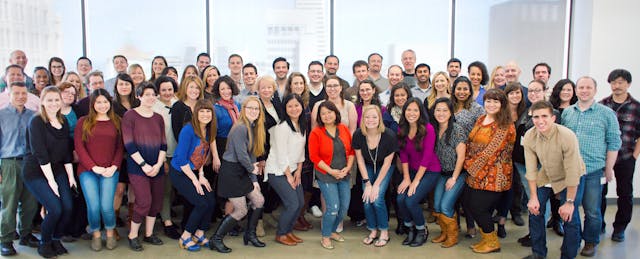Not every company can be Facebook or Google, offering free catered meals and colorful open spaces, but there are ways to build positive work environments with productive and happy employees on a smaller budget.
To learn the ins and outs of building great office ethos for edtech in particular, EdSurge interviewed executives from two companies that have stood out when it comes to workplace environment: Clay Whitehead, CEO of PresenceLearning, a live, online therapy and diagnostic company known for its rave reviews on Glassdoor; and Erin Anderson, senior vice president of human resources at online degree company 2U, which has been recognized by both the Denver Post and Washington Post as a top-ranked workplace in its region.
Building Up Values
For some companies, mission statements only live on a web page. But if you ask Whitehead, what’s more important is for a company to go beyond just determining and posting its goals and values.
“Everyone here knows the purpose of why we exist,” says Whitehead. “Our values, who we are, our strategy, what we do and how are we going to achieve our vision.” For him, it is crucial for the staff to know their role, the company’s vision and values, and how it all fits together.
Clearly transmitting and reiterating this information to staff is critical for maintaining the motivations and aspirations of employees, Whitehead says. At PresenceLearning, he reinforces these values by regularly sharing stories that reflect the purpose of their work. “This can be a seemingly small story like a kid who waves his hand in class for the first time in awhile,” explains Whitehead. “But that’s a big achievement sometimes.”
Anderson from 2U also firmly believes in building up company values. So much so, that the human resource department tasked managers with finding employees for their No Back Row Award—a prize that recognizes employees who embody the company's mission and values daily.
“Companies often put up values on a screen and say, ‘this is what we care about.’ But then they don’t talk about them, they don’t incorporate them into their day to day,” says Anderson. To avoid that at her company, Anderson says values are regularly included in employees’ work, whether that be quarterly check-ins or written directly on their name badges. “There’s a constant reminder,” she says
Building Up Teams
Building great teams doesn’t mean everyone shares similar interest or abilities. At 2U, Anderson searches for people with diverse backgrounds, skills and interest to fill teams. “The key is creating a well-rounded team. You don’t want folks all thinking the same about an issue because you are not going to come up with new and creative solutions,” says Anderson.
She also notes that sometimes evaluating strengths means managers will have to hire someone who is have unique qualifications. “You take a little bit of a risk when you are interviewing folks who have a level of expertise that you are not as specialized in. You have to rely on what they are saying to you, and their references.”
When it comes to vetting new employees at PresenceLearning, Whitehead says, “we do behavioral interviews and case studies to try to understand how someone thinks about problems and works collaboratively with us before they start.”
Whitehead also searches for candidates who work well under flexible management and says it's important to they hire people are comfortable without a lot of oversight. “We don't hire micromanagers, we hire good people who work hard,” he continues.
Keeping the Wheels Turning
It’s impossible for nearly any company to avoid hitting a few bumps in the road. And maintaining a positive culture during the dark hours can be even more challenging.
As a human resources manager, Anderson hears many office complaints that others don’t hear. Her company has expanded dramatically during her six years there, going from about 125 employees to about 1,200. But that growth has come with its own set of challenges. During tough or transitionary time, she says it is critical for people in her role to stay committed and be available to support the staff. “First and foremost we make sure that we make ourselves accessible. There is a bit of a stigma around HR out in the world,” says Anderson, noting how some characterize HR as being unavailable and unhelpful. “We go out of our way to way to break that stigma down.”
She believes in taking a more active approach by reaching out to employees. They do check-ins, surveys, feedback sessions and stay interviews with their staff. And when dealing with employee complaints, she tries to honor their concerns.
“Take the time to understand why employees feel the way they do,” says Anderson. “It’s about providing them with a forum where they can voice their opinions can be heard.”


